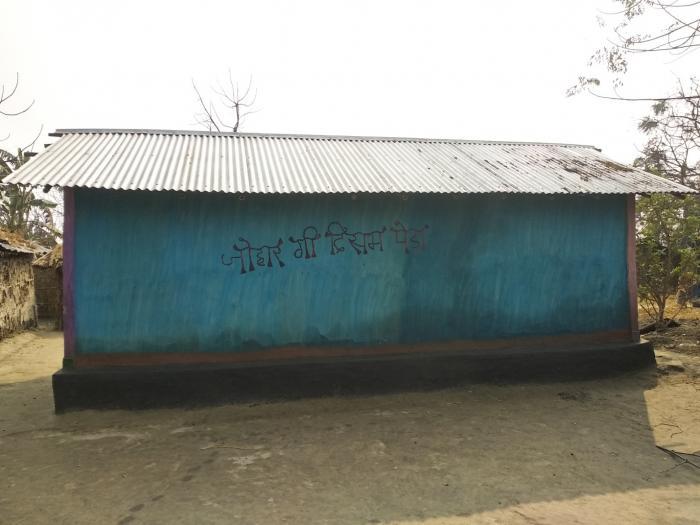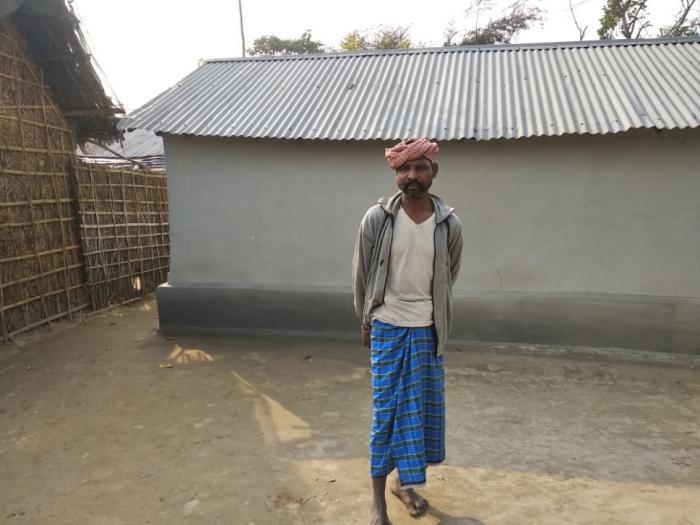Bihar’s Tribals Face Disenfranchisement Threat in Wake of CAA

Ranka Tudu (bare body) and another tribal villager sitting near his house.
Bihar is home to people of different identities across religion, caste, community, etc. This diversity has come under severe constraints after Parliament passed a contentious law called the Citizenship Amendment Act (CAA). This led to massive anti-CAA protests and demonstrations across the country. Voices from academia, social spheres have pinpointed the anti-minority character of the law which makes it possible for Hindus, Sikhs, Christians, Buddhists, Parsees and Jains, who came to India from Pakistan, Afghanistan and Bangladesh before December 31, 2014, to obtain Indian citizenship and excludes Muslims from obtaining citizenship through this route.
The ground reality of fulfilling the criteria on citizenship spells a grim picture about a section of the demography. This debate is required to go beyond the anti-Muslim nature of the legislation, as there are millions of those in this country who will certainly fail to come up with required set of documents to prove their citizenship, and procuring them officially is beyond their reach.
Tribals in Bihar, since the state’s partition and formation of Jharkhand, have never been in focus and their voice remains in the fringes of the ongoing protests and discussions on CAA.
Endangered Tribals
As per the 2001 Census, the tribal population in Bihar was 758,351, that is, 0.9 % of the total population (8.2 crore) of the state. They are overwhelmingly rural dwellers. The Seemanchal region of Bihar, which comprises of four districts -- Katihar, Kishanganj, Araria and Purnea -- have a majority of tribes. The rest are scattered in Banka, Saharsa, Siwan, Supaul, Madhepura, Ara, Kaimur, etc Among these districts, Katihar has the highest proportion 6% followed by Purnea at 4.5 %.

A tribal household with a message in Santhali language. It says: We welcome our guests with folded hands.
Adyanan Nagar village in Krityanand Nagar (K Nagar) block of Purnea district is one such place that comprises approximately 70 tribal houses. From entry to exit, the village has a muddy path in place of a road, most houses are either made of straw, mud or tin. The dwellers are mostly Santhals, with sub-groups such as Tudu, Murmu, Marandi, etc. Nearly all villagers are involved in daily wage work or are agricultural labourers.
Sushil Marandi, a daily wager, on being asked about land, said he doesn’t own land. He undertakes farming as a sharecropper, that is, to fulfill his food requirement and on a few days, he works as a daily wager in households of those who possess large land plots.

Ramesh Baski, a tribal in Adyanan nagar village, Purnea.
Ramesh Baski owns just a “tin roofed house polished with mud”. He concedes that he does not possess any document that can prove where his family or parents hailed from and neither about his birth. While talking to Newsclick, he claimed that his ancestors migrated here from Godda district (now in Jharkhand), so this displacement added to unavailability of any documentary record.
As per the 2001 Census report, among the major tribes in the region, Santhals and Oraons have over 60% workers who are agricultural labourers, followed by Munda, Gond and Kharwar. The Kharwar and Santhal community have every fourth worker as a ‘Cultivator’ and Mundas have every third worker who belongs to the category of ‘Other Workers’.
“My age does not favour my efforts to earn a livelihood anymore. My son, who is daily wage worker, is the sole bread-earner in the family,” Ranka Tudu told Newsclick.
When asked about documents that can furnish details about his birth, his parents and property, Ranka was blank. He paused for seconds and said: “We do not have access to electricity, ration, pension or any scheme floated by the government, you are seeking something unthinkable,” he added.
Talking to Newsclick, Yamuna Murmu, a well-known tribal rights activist in Purnea district, said the tribal community is not aware of the upcoming threat of exclusion in the form of CAA.
They are bound to fail to produce documents in relation to their existence as they fight an everyday a battle to survive and are on the last rungs of the caste hierarchy, he said, adding that displacement for the sake of development compelled tribals to leave their land and migrate. The citizenship process will place them in another precarious situation.
“Our ancestors -- Tilka Majhi, Birsa Munda, Sidhu-Kanhu fought vehemently against the Britishers for our rights and independence but sadly today, the (Narendra) Modi government is seeking proof of our relation and belongingness to our motherland. People protesting across country are sloganeering ‘Hum Kaagaz Nahi Dikhayenge’ ( We will not show documents) but it’s an undeniable truth for the tribal community because it has nothing to show,” he added.
Murmu also pointed at discrimination based on caste and race that still exists in the district. The landlords and upper caste always had problem with their presence, even on the outskirts of villages and on question of landholding. The landless populations’ presence has remained an issue of intolerance in past, he said, adding that in addition to this, CAA will create havoc during the time of applying for the process of National Population Register or NPR and National Register of Citizens or NRC.
A report published in 2016 in The Hindu stated that the Bihar government was clueless about its tribal population and did not even have a tribal commission. Since the 2001 Census, the Bihar government has not recorded the exact population of Schedule Tribes in the state. Tribal areas nationwide are covered by the ‘Fifth Schedule’ of Constitution and, at present, Madhya Pradesh, Maharashtra, Andhra Pradesh, Telangana, Chhattisgarh, Gujarat, Himachal Pradesh, Jharkhand, Odisha and Rajasthan are part of it. But Bihar has no official record of destitute tribals, despite their population in lakhs.
Tag of ‘Doubtful Citizens’
If the question of deprivation and landlessness among tribals is pondered upon, a new set of challenges will erupt in terms of determining their citizenship. One clause in the CAA will lead to unrest, and that is the provision of ‘doubtful citizen’.
The ‘doubtful citizenship’ provision was added in the Citizenship Rule, 2003 under which the NPR is prepared. This has no definition and sub-rule (4) of Rule 4 just says that an individual or a family would be identified as ‘doubtful’ in the list made by the ‘Local Registrar’.
Once this is done, the person or persons will be informed. These persons will then have to make umpteen trips to prove their bonafides. At that stage, documents will have to be produced.
A state, such as Bihar, known for caste-based animosity, upper caste- organised atrocities against the backward castes, gives space for powerful forces to act against the deprived sections through misuse of law. The entire exercise of placing someone in ‘Doubtful Citizen’ category will, therefore, solely depend on local officials getting influenced by rich and powerful vested interests. Most poor people hardly have birth certificates, leave alone the details of previous generations.
It’s ironical that an indigenous community, dependent on agrarian economy and who remains landless, is answerable to prove citizenship by showing documents. And if this is done for formality, it will be a cruel joke on them. Daily bread-earners will be pushed to pay brokers to procure documents at the block office.
At a time when the state government has bitterly failed even to recognise the most marginalized sections, the law of CAA-NRC-NPR will disenfranchise all tribals, who stand last in the order of social hierarchy of this country.
The writer is an independent journalist and researcher based in Bihar. The views are personal.
Get the latest reports & analysis with people's perspective on Protests, movements & deep analytical videos, discussions of the current affairs in your Telegram app. Subscribe to NewsClick's Telegram channel & get Real-Time updates on stories, as they get published on our website.























